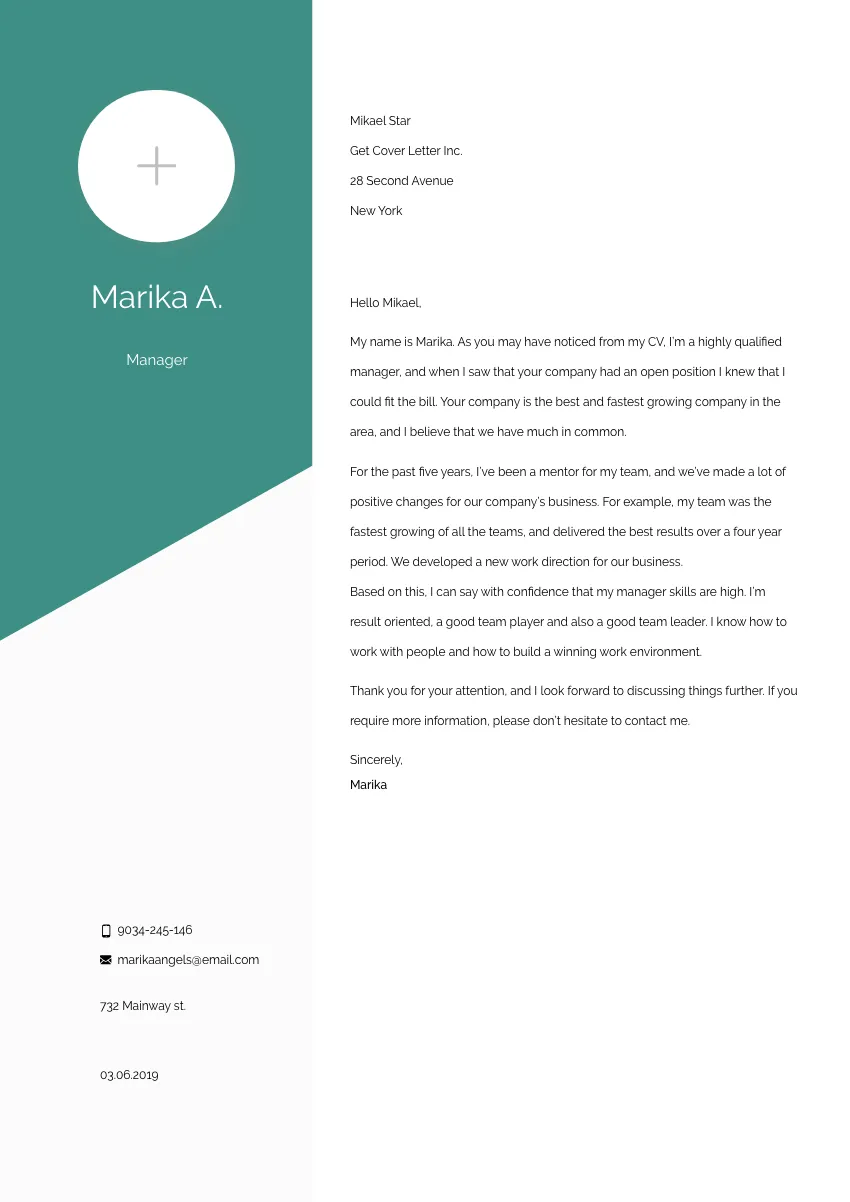Why Remote Cover Letters Matter
In the increasingly competitive landscape of remote work, a compelling cover letter is no longer optional—it’s essential. A well-crafted cover letter serves as your initial introduction, setting the tone for your application and providing a personalized glimpse into your qualifications, experience, and suitability for the role. Unlike a resume, which provides a static overview of your professional history, the cover letter allows you to tell your story, connect with the hiring manager on a personal level, and demonstrate your genuine interest in the position and the company. This is particularly crucial in the remote work environment, where the absence of face-to-face interaction makes it even more important to create a strong first impression. The cover letter is your opportunity to showcase your unique value proposition and differentiate yourself from other candidates. A generic or poorly written cover letter can immediately disqualify you, while a well-structured and engaging one can significantly increase your chances of landing an interview.
Understanding the Remote Job Market
Before diving into the specifics of writing a remote cover letter, it’s important to understand the current landscape of the remote job market. The demand for remote positions has surged in recent years, driven by technological advancements and changing work preferences. This surge has created both opportunities and challenges for job seekers. Remote roles span various industries, from technology and customer service to marketing and project management, offering a wide array of options for skilled professionals. However, this increased competition necessitates a strategic approach to your job search, including a tailored cover letter that highlights your relevant skills and experience. Researching the specific companies and roles you’re applying for is crucial. Understanding their culture, values, and requirements will enable you to customize your cover letter effectively, demonstrating that you’ve taken the time to understand their needs. Tools like LinkedIn, company websites, and industry publications can provide valuable insights into the remote job market, helping you to identify the best opportunities and tailor your application accordingly. Keeping your finger on the pulse of this quickly evolving landscape is key to success.
Highlighting Remote Work Skills

Remote work demands a unique set of skills beyond the technical expertise required for the job itself. In your cover letter, it’s crucial to emphasize these skills to demonstrate your suitability for a remote environment. These skills often center on self-discipline, effective communication, and the ability to manage time and tasks independently. Successfully working remotely requires a proactive approach, strong organizational abilities, and a commitment to staying connected with team members and supervisors. Highlight your proficiency in using communication tools such as Slack, Microsoft Teams, or Zoom, and explain how you utilize these platforms for seamless collaboration and reporting. The ability to manage your time effectively, prioritize tasks, and meet deadlines without direct supervision is also paramount. Showcasing these skills in your cover letter assures the hiring manager that you possess the necessary attributes to thrive in a remote role and contribute to the team’s success. Use concrete examples from your previous experiences to illustrate your capabilities. For instance, describe how you successfully managed a project remotely, highlighting your communication strategies, problem-solving skills, and ability to work independently.
Key Skills for Remote Success
To excel in a remote position, certain key skills are non-negotiable. These skills demonstrate your capacity to work effectively, efficiently, and collaboratively from a distance. By highlighting these in your cover letter, you immediately establish your credibility as a strong candidate. Let’s dive into some of the most critical skills that employers actively seek in remote workers.
Communication Skills
Effective communication is the cornerstone of successful remote work. You must be able to articulate your ideas clearly, both verbally and in writing, and actively listen to and understand the perspectives of your colleagues. This includes the ability to tailor your communication style to different audiences and contexts. Showcasing this skill involves highlighting your proficiency in various communication tools (email, chat, video conferencing), your ability to provide regular updates, and your comfort with asking clarifying questions. Give specific examples of how you have successfully navigated communication challenges in remote settings, such as resolving conflicts, providing constructive feedback, and fostering positive relationships with remote teams.
Time Management Skills
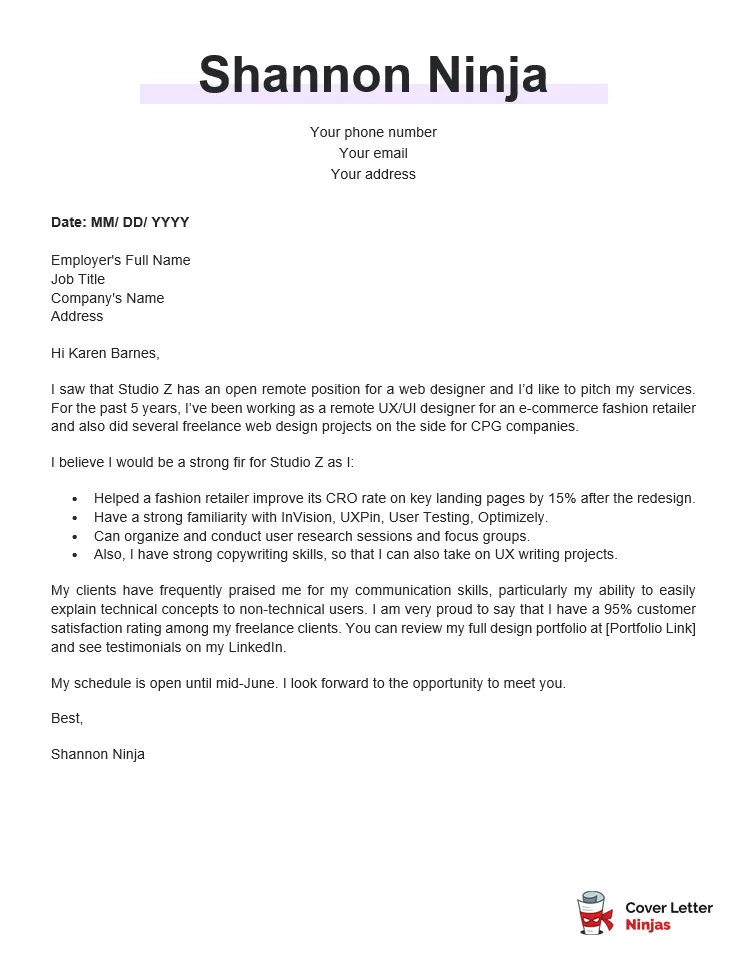
In a remote environment, strong time management skills are vital. With less direct supervision, you must be able to set priorities, manage your workload efficiently, and meet deadlines consistently. Illustrate your time management capabilities by highlighting your organizational skills, your ability to create and adhere to schedules, and your use of productivity tools. Mention any strategies you employ to minimize distractions and maximize your focus. For example, talk about how you use project management software or time-blocking techniques to keep your work on track and maintain a healthy work-life balance.
Technical Proficiency
Technical proficiency is essential for remote work. You need to be comfortable using a range of software and platforms to perform your job effectively. This includes understanding the specific tools required for the role and demonstrating a general aptitude for technology. In your cover letter, mention any relevant technical skills, such as experience with project management software, CRM systems, or specific programming languages. Demonstrate your ability to troubleshoot technical issues and your willingness to learn new technologies. Mentioning your familiarity with video conferencing software like Zoom, Microsoft Teams, or Google Meet will also show you are prepared for collaborative remote work environments.
Demonstrating Your Remote Suitability
Beyond listing your skills, your cover letter should actively demonstrate your suitability for a remote position. This involves illustrating your experience working remotely, highlighting your understanding of the unique challenges and benefits of remote work, and expressing your commitment to thriving in such an environment. Providing specific examples of your remote work experiences is crucial. Instead of simply stating that you have worked remotely, describe the projects you completed, the tools you used, and the outcomes you achieved. This level of detail will provide concrete evidence of your capabilities and give the hiring manager a clear picture of your skills. Showcasing your knowledge of the remote work culture will further enhance your application. Mention any remote work best practices you follow. In addition, highlight your ability to maintain open communication and collaboration with remote team members. This proactive approach proves that you’re well-prepared for the remote work environment.
Showcasing Remote Work Experience
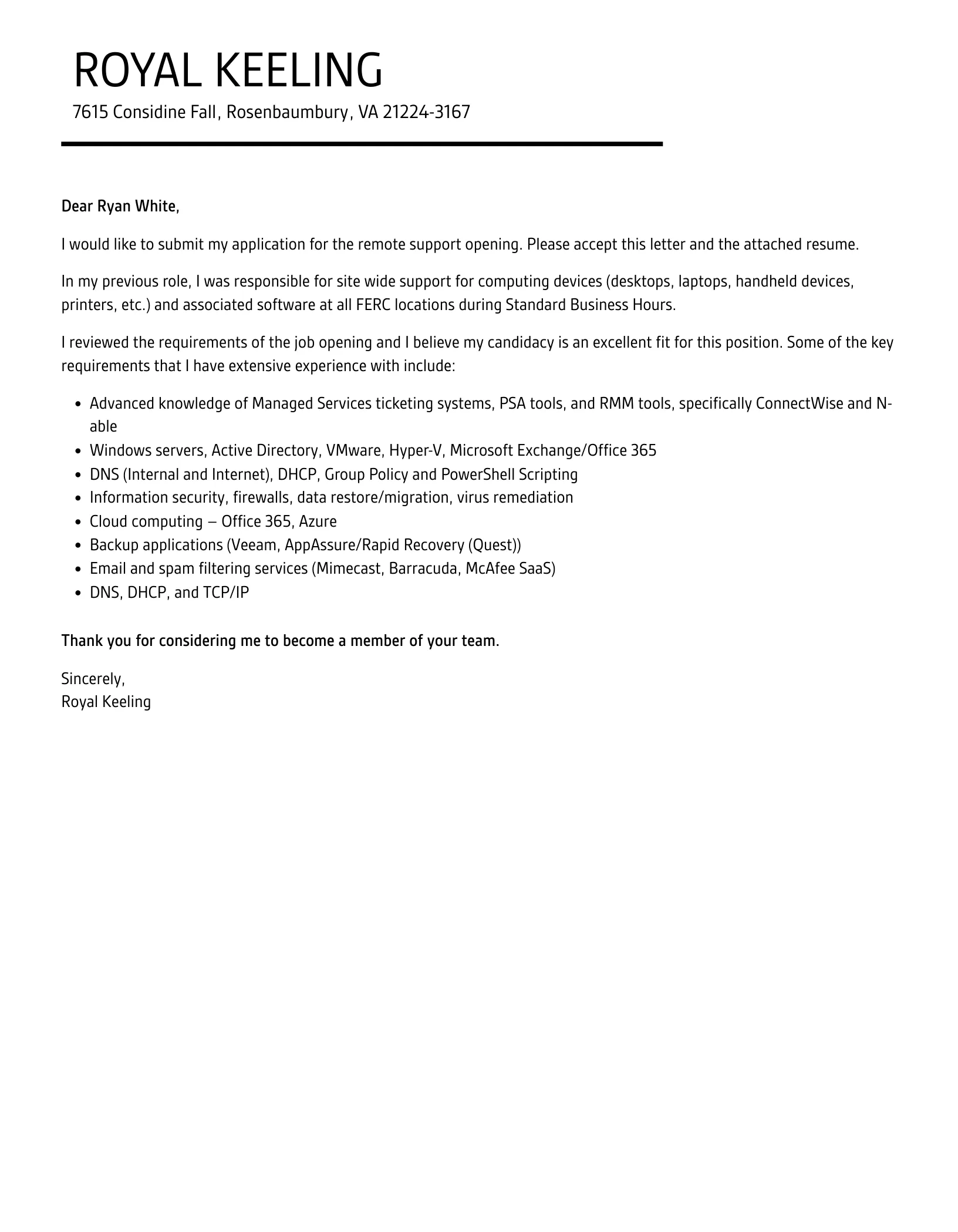
If you have prior experience working remotely, be sure to emphasize it prominently in your cover letter. Describe the specific roles and responsibilities you held in those positions, and highlight your achievements. Whenever possible, quantify your accomplishments using numbers and metrics. For example, you could mention how you improved efficiency, reduced costs, or increased sales while working remotely. Show how you collaborated with remote teams, the tools you used, and the strategies you employed to ensure effective communication and project success. Even if your previous roles weren’t fully remote, highlight any instances where you worked independently or managed remote projects or teams. Provide specific examples to give the hiring manager a clear understanding of your capabilities. For instance, you could describe how you successfully managed a project with team members in multiple locations, utilizing project management tools and virtual collaboration platforms.
Tailoring Your Cover Letter
A generic cover letter is easily recognizable and often disregarded. To make your application stand out, tailor your cover letter to each specific job and company. This level of personalization demonstrates your genuine interest in the role and the organization. Begin by thoroughly researching the company and the specific position. Understand the company’s mission, values, and culture, as well as the requirements and expectations outlined in the job description. Use this information to customize your cover letter, addressing the specific needs and priorities of the employer. Mention the company by name and reference the role you are applying for. Show how your skills, experience, and goals align with the requirements of the position and the values of the company. By demonstrating this alignment, you signal to the hiring manager that you are a good fit for the role. Customization shows that you’ve invested the time to understand the company, making your application more compelling. This effort can significantly increase your chances of getting an interview.
Analyzing the Job Description
Carefully analyze the job description to identify the key requirements, skills, and qualifications that the employer is seeking. Pay close attention to the language used in the description and mirror the tone and keywords in your cover letter. Look for specific phrases and keywords that the employer uses to describe the role. Then, incorporate those terms throughout your cover letter. Identify the most important responsibilities and the skills that the employer values most. Structure your cover letter to highlight how your experience and abilities align with these specific requirements. Addressing each requirement directly demonstrates that you have the skills and qualifications needed to excel in the role. Don’t just re-list your skills. Instead, provide specific examples of how you have used your skills to achieve results in past positions. This level of detail provides compelling evidence of your capabilities.
Customizing Your Letter
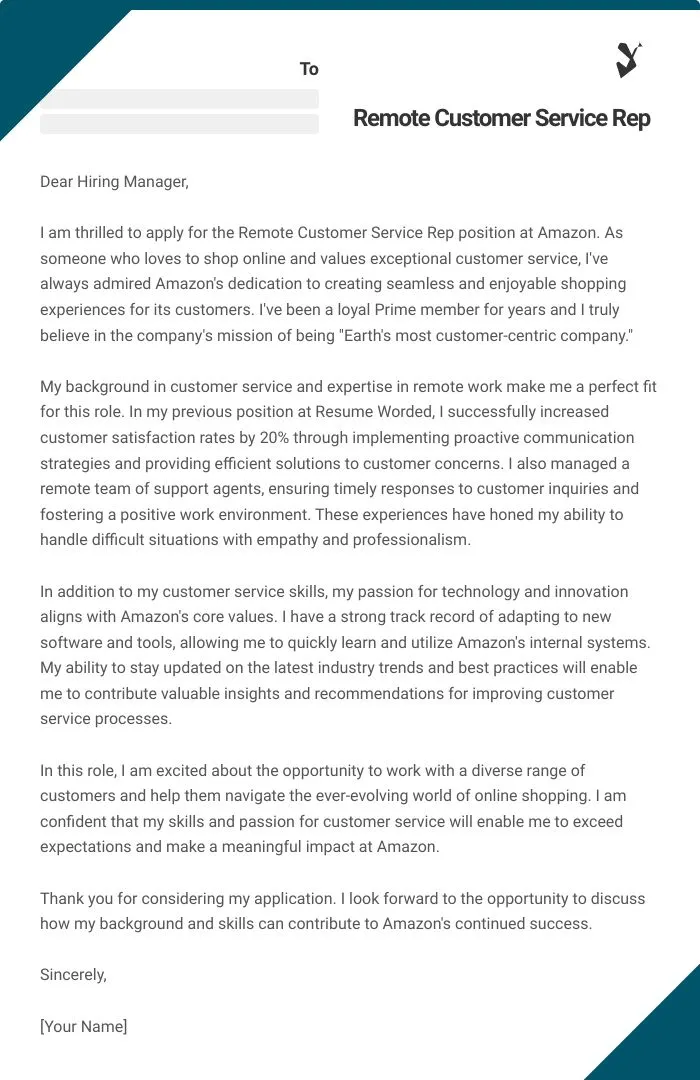
Once you’ve analyzed the job description, customize your cover letter to address the specific needs and expectations of the role. Show how your skills and experience align with the job requirements and how you can contribute to the company’s success. In the opening paragraph, clearly state the position you are applying for and why you are interested in the company. In the body of the cover letter, provide specific examples of your achievements, quantifying your accomplishments whenever possible. Tailor your examples to match the key requirements outlined in the job description. Use the language and keywords that the employer uses to describe the role, demonstrating that you understand the position and its requirements. Show genuine enthusiasm for the role and the company. Express your interest in the company’s mission, values, or products. Indicate why you are interested in working for this particular organization. Mentioning specific projects or initiatives that excite you can significantly boost your application. By customizing your letter, you prove that you are not sending out generic applications but instead are genuinely interested in the specific opportunity.
Writing a Strong Opening
Your opening paragraph is your first and perhaps only chance to grab the hiring manager’s attention. It sets the tone for the entire cover letter and determines whether the reader will continue. A strong opening quickly establishes your purpose for writing and demonstrates your understanding of the role. Avoid generic opening lines that fail to capture the reader’s attention. Start with a concise and compelling statement that immediately communicates your interest in the position. Mention the specific role you are applying for and where you found the job posting. Immediately state why you are interested in the position and the company. Demonstrate your understanding of the company’s mission, values, or recent accomplishments. Tailor your opening to reflect the specific requirements of the role. If the job description emphasizes a particular skill or experience, mention it in your opening. Show how your background aligns with the role’s expectations from the start. This targeted approach demonstrates that you’ve done your research and are a good fit for the position.
Grab the Recruiter’s Attention
To captivate the recruiter’s attention from the first sentence, it’s essential to make your cover letter stand out. Begin with a captivating opening line that directly addresses the company’s needs or the specific challenges of the role. Highlight a recent achievement or a relevant skill that aligns with the job description. Tailor your opening to address the company’s mission, values, or recent accomplishments. This shows that you have taken the time to understand their work. Use action verbs and powerful language to create a sense of excitement. Instead of stating your qualifications, demonstrate your skills with specific examples. Show, don’t just tell, by providing quantifiable results and mentioning specific achievements. Clearly state your interest in the position and explain why you are the ideal candidate. Conclude with a strong call to action, inviting the recruiter to read the rest of your application.
Highlighting Your Achievements
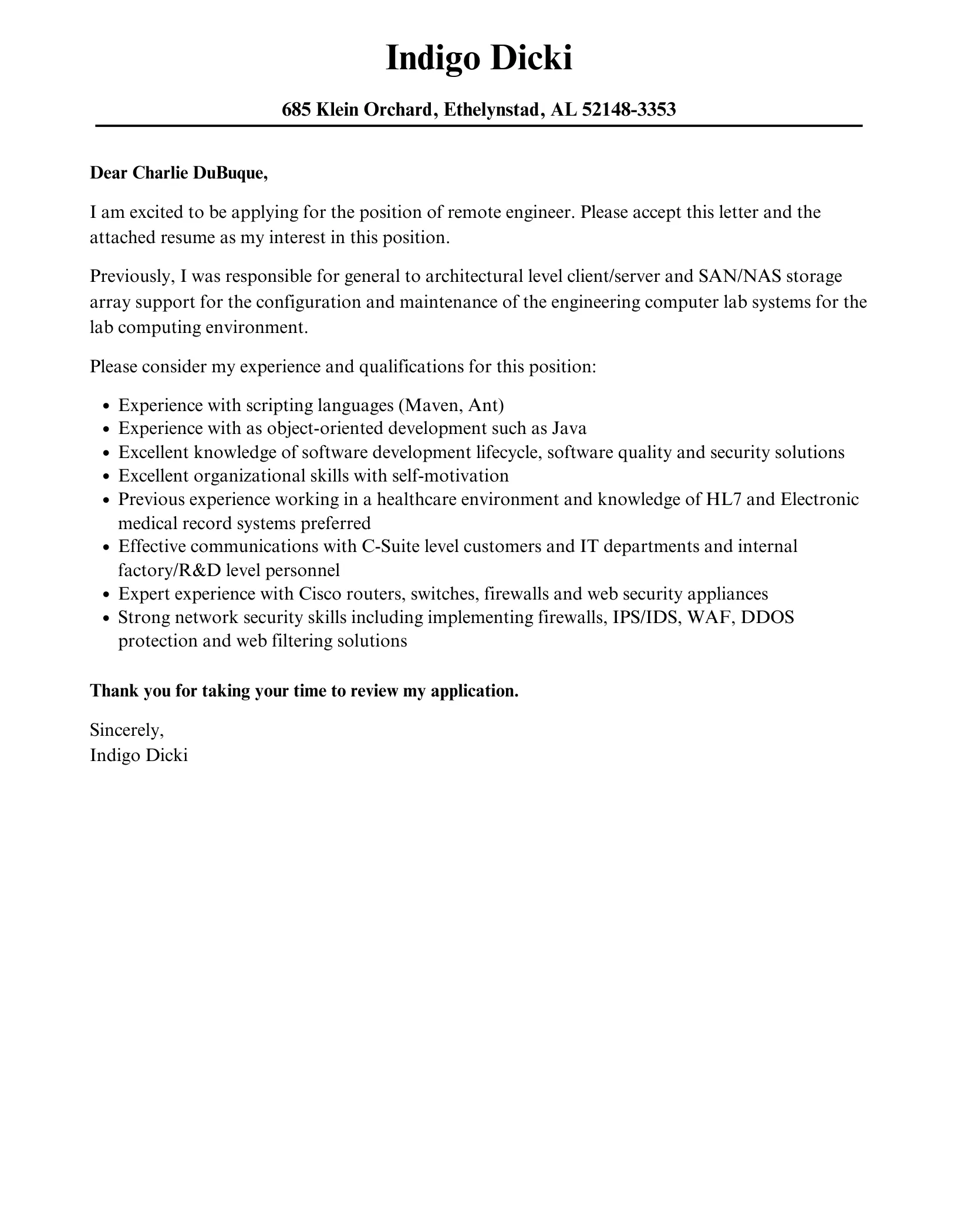
Instead of simply listing your job responsibilities, focus on highlighting your achievements and quantifying your accomplishments. This approach demonstrates your value to potential employers and provides concrete evidence of your skills and abilities. Instead of stating your job duties, use your cover letter to detail specific achievements that prove your impact. For example, instead of saying “Managed social media accounts”, state “Increased social media engagement by 30% within six months.” Use quantifiable results to showcase the positive impact you’ve made in previous roles. Include specific numbers, metrics, and data to validate your accomplishments. These metrics provide concrete evidence of your value. Tailor your examples to match the job requirements. Show how your achievements align with the key responsibilities and expectations of the role. Provide concrete examples that directly relate to the job. By emphasizing your achievements, you’re providing the hiring manager with compelling evidence of your abilities, increasing your chances of landing an interview.
Quantifying Your Accomplishments
Quantifying your accomplishments in your cover letter is a powerful way to demonstrate your value and impact. Using numbers, percentages, and metrics provides concrete evidence of your skills and helps employers understand the results you can deliver. Whenever possible, quantify your achievements. Instead of saying you improved sales, specify the percentage increase. For instance, “Increased sales by 20% in one year.” Use metrics to illustrate your impact. When detailing your accomplishments, be specific about the outcomes you achieved. For example, “Reduced customer service response time by 15%” or “Increased website traffic by 25%.” This level of detail helps employers quickly grasp the value you bring. Choose the metrics that best align with the job requirements. Tailor your accomplishments to match the skills and responsibilities listed in the job description, making your achievements relevant and compelling. Providing this level of information shows hiring managers the tangible results you have delivered in the past, which can significantly increase your chances of landing an interview.
Using Action Verbs
Using strong action verbs is essential for creating a cover letter that captures attention and showcases your accomplishments. Action verbs make your writing more dynamic and impactful, helping you to demonstrate your skills and expertise. Choose action verbs that highlight your accomplishments and skills. Begin each bullet point or sentence with a powerful action verb. Use strong verbs that convey your capabilities and contributions. For example, instead of writing, “Responsible for managing projects,” write “Led project teams, resulting in on-time delivery.” Tailor your action verbs to align with the requirements of the job. Use verbs that are relevant to the specific role and that reflect the key skills and responsibilities mentioned in the job description. Vary your action verbs to maintain engagement and show the breadth of your skills. Avoid repeating the same verbs throughout your cover letter. Use a variety of verbs to show your versatility and demonstrate your accomplishments in different areas. This active and engaging language makes your cover letter more compelling and makes your experience more memorable.
Addressing the Remote Aspect
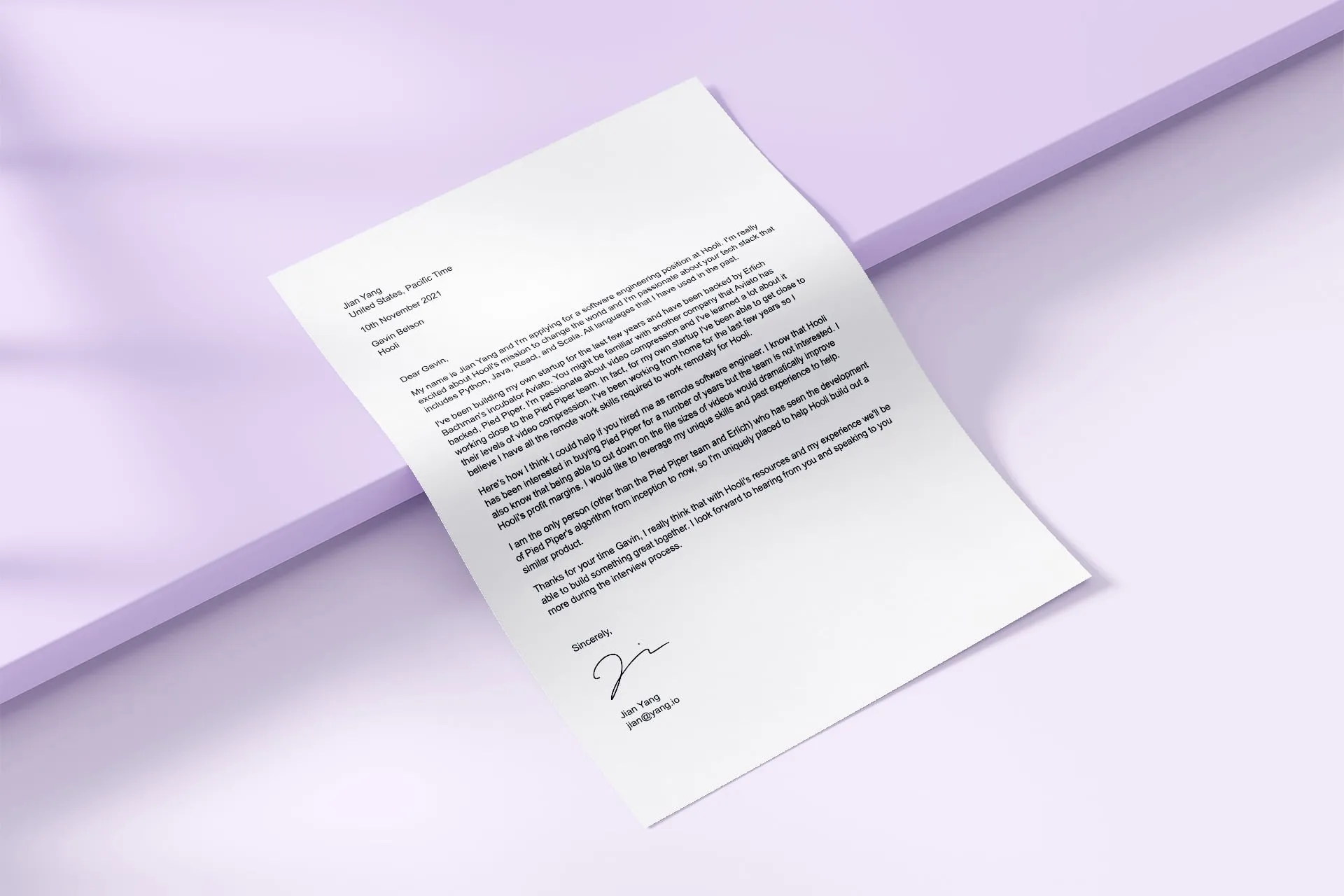
When writing a cover letter for a remote position, you must explicitly address the remote aspect. This involves demonstrating your understanding of remote work, highlighting your preparedness for a remote environment, and expressing your commitment to thriving in a virtual setting. Your cover letter needs to showcase your experience and how you’ve successfully worked remotely in the past. Emphasize your ability to work independently, manage your time effectively, and communicate clearly with remote teams. Show that you are well-equipped to handle the unique challenges of remote work. In your letter, mention the strategies you use to stay connected with remote colleagues. Show your ability to use communication tools and platforms effectively. Discuss your experience using video conferencing, instant messaging, project management software, and other tools necessary for collaboration in remote settings. Describe your approach to staying connected, managing time zones, and maintaining effective communication with remote colleagues. This proactive demonstration of your skills will impress the hiring manager and showcase your remote work readiness.
Emphasizing Remote-Specific Skills
When applying for a remote role, highlight your skills that are particularly relevant to remote work. Since remote work involves working independently and collaborating virtually, emphasize your ability to manage your time, stay organized, and communicate effectively. In your cover letter, highlight your proficiency in various communication tools (Slack, Microsoft Teams, Zoom, etc.), your ability to provide regular updates, and your comfort with asking clarifying questions. Your proficiency in project management tools and virtual collaboration platforms will demonstrate your ability to thrive in remote environments. Showcase your ability to work independently and your skills in managing projects without direct supervision. For example, describe how you effectively managed your time to meet project deadlines. By showcasing these specific skills, you prove that you have the necessary tools to succeed in a remote environment. This makes you a competitive candidate.
Showcasing Your Remote Setup
Demonstrating your understanding of the technical requirements of remote work can significantly enhance your cover letter. This involves showing that you have the necessary technology, a suitable workspace, and a reliable internet connection. This reassures the hiring manager that you’re prepared to start contributing from day one. Briefly describe your home office setup and the technologies you use to work efficiently. Mention your high-speed internet connection, your computer setup, and any other tools or resources that support your productivity. Discuss your experience working with various software, tools, and platforms relevant to the role. Include your familiarity with project management software, CRM systems, or other technologies relevant to the job. This provides tangible evidence that you are ready to work. A dedicated workspace, free from distractions, will highlight your commitment to professionalism and productivity. Showing that you are set up and ready to work can greatly increase your chances of landing the job.
Formatting for Remote Applications
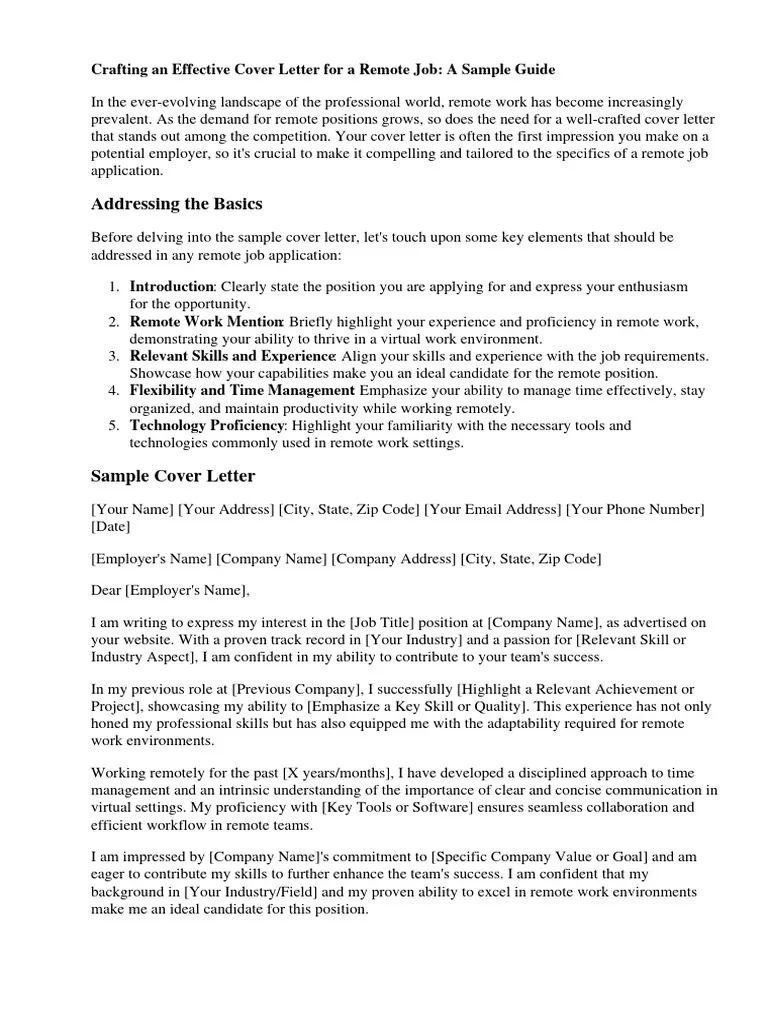
The format of your cover letter is just as important as its content. A well-formatted letter is easy to read, professional, and demonstrates your attention to detail. A clear and concise format improves readability and enhances your overall presentation. The format should be clean and uncluttered. Ensure that your cover letter is well-organized and easy to scan. Use clear headings and subheadings to break up large blocks of text. This makes it easier for the hiring manager to find the information they are looking for. The formatting choices demonstrate your professionalism and your attention to detail, which are vital in remote positions.
Choosing the Right Font
The font you choose can impact the readability and professional appearance of your cover letter. Choosing the right font shows your attention to detail and enhances the overall presentation. Select a professional and easy-to-read font. Stick to standard fonts like Times New Roman, Arial, Calibri, or Helvetica. These fonts are widely recognized, clean, and easy on the eyes. Ensure your font size is easy to read without being too small or too large. A font size between 10 and 12 points is generally recommended. Consider the readability of your font, especially on different devices. Avoid using ornate or unusual fonts, which can be distracting and make your cover letter difficult to read. The choice of font will influence the reader’s impression of your attention to detail. By choosing the right font, you show that you value professionalism.
Keeping it Concise
In today’s fast-paced world, hiring managers often have limited time to review applications. A concise cover letter shows respect for their time and demonstrates your ability to communicate effectively. Keep your cover letter to one page. Avoid writing excessively long paragraphs. Use short, focused sentences to get your points across quickly. Focus on the most relevant information. Prioritize the skills and experiences that directly relate to the job requirements. Avoid including unnecessary details or irrelevant information. The goal is to make your cover letter easy to read and engaging, showing the hiring manager that you value their time and are able to communicate effectively. Conciseness demonstrates your respect for the recruiter’s time, leaving a strong positive impression.
Proofreading and Editing
Proofreading and editing your cover letter is a crucial step in ensuring it is polished, professional, and free of errors. A cover letter riddled with typos, grammatical errors, or formatting issues can undermine your credibility and make you appear less attentive to detail. Reviewing your cover letter for errors ensures that your application makes a positive impression. Errors can distract the hiring manager from your skills and experience. Always proofread your cover letter thoroughly before submitting it. Check for any spelling mistakes, grammatical errors, and formatting inconsistencies. Read your cover letter aloud to catch awkward phrasing or sentences that don’t flow well. Using a grammar and spell-checking tool can help identify errors that you might miss, but be sure to review these suggestions carefully. A polished cover letter demonstrates your attention to detail and your professionalism, which is very important in remote work.
Seeking Feedback
Before submitting your cover letter, consider seeking feedback from trusted sources. Another person can provide a fresh perspective and help identify any areas that need improvement. Asking others to review your cover letter can significantly enhance its effectiveness. Ask someone to review your cover letter. They can help you identify areas where your writing could be clearer, more concise, or more impactful. Ask colleagues, friends, or family members to read your cover letter. They can provide constructive feedback on the clarity, tone, and overall effectiveness of your letter. Consider asking someone with experience in your field to review your cover letter. They can offer insights into industry-specific language and make sure your cover letter effectively showcases your expertise. Receiving feedback and incorporating suggestions can substantially improve your cover letter, increasing your chances of success.
Cover Letter Examples for Remote Roles
Reviewing cover letter examples for remote positions can provide valuable insights and guidance as you write your own. These examples can help you understand how to structure your letter, what information to include, and how to highlight your skills and experience effectively. Seeing how others have successfully crafted their cover letters can inspire you. Explore a variety of cover letter examples to understand the different styles, tones, and approaches used. Look for examples that align with the specific roles and industries you are targeting. Pay attention to how the candidates highlight their remote work experience, skills, and accomplishments. Adapt these examples to reflect your own experiences and qualifications. Remember that the key is to tailor your cover letter to each specific job. Your goal should be to showcase your unique strengths and make a compelling case for why you are the best fit for the role.
Example 1 Project Manager
This cover letter highlights the project manager’s experience in managing remote projects. It will showcase his skills in project planning, team leadership, and communication. The letter will focus on quantifiable achievements, such as on-time project delivery and budget management. The cover letter should clearly demonstrate the candidate’s familiarity with project management tools and remote collaboration software. The letter should describe experience in leading and motivating remote teams, ensuring effective communication and collaboration. It should highlight skills in risk management, problem-solving, and stakeholder management. The candidate would emphasize experience in using project management methodologies, like Agile or Waterfall.
Example 2 Software Engineer
This software engineer cover letter will focus on technical skills, experience, and projects, along with the ability to work independently and collaborate remotely. The letter would highlight the candidate’s proficiency in relevant programming languages and technologies. The letter will emphasize experience in software development, testing, and deployment. The candidate would show experience in using software development methodologies, such as Agile or Scrum. The candidate should showcase the ability to work effectively with remote teams. The candidate will mention any contributions to open-source projects. The letter must also include experience with version control systems like Git.
Example 3 Customer Support
This cover letter will emphasize customer service skills, communication abilities, and the ability to resolve customer issues in a remote environment. The letter will demonstrate experience in providing excellent customer service. The candidate would show experience in using customer service software. The letter should highlight strong written and verbal communication skills. The candidate would show experience in working independently and solving customer issues efficiently. The candidate would showcase experience in collaborating with remote teams. The letter will emphasize a customer-centric approach and a passion for helping customers.
Common Mistakes to Avoid
Avoid common mistakes that can hurt your chances of landing an interview. These pitfalls can be detrimental to your application. Understanding what to avoid is as important as knowing what to include.
Generic Cover Letters
Submitting a generic cover letter is a common mistake that can immediately disqualify your application. A generic cover letter that lacks personalization and doesn’t address the specific requirements of the job. Sending the same cover letter to multiple companies signals a lack of effort and research. It may not address the specific needs of the company. Make sure you demonstrate your interest in the company’s mission, values, or recent achievements. Tailor your letter to reflect the key skills, experiences, and qualifications mentioned in the job description. This attention to detail demonstrates that you have taken the time to understand the role.
Ignoring the Remote Requirements
Ignoring the remote-specific requirements of the job is another significant mistake. You must emphasize your experience with remote work and highlight the skills needed to succeed in a virtual environment. Your cover letter needs to demonstrate that you are capable of thriving in a remote setting. Make sure you highlight your experience with remote work. Include examples of how you have successfully managed projects, collaborated with teams, and communicated effectively while working remotely. This will demonstrate your ability to adapt and succeed in this format. Address your ability to manage your time effectively, prioritize tasks, and meet deadlines without direct supervision. Showcase your skills in virtual collaboration and your ability to use various communication tools. By highlighting these areas, you will establish yourself as a strong candidate for a remote position.
Lack of Proofreading
Failure to proofread your cover letter is a critical error that can significantly undermine your application. Typos, grammatical errors, and formatting mistakes can create a negative impression and make you appear unprofessional. Always thoroughly proofread your cover letter before submitting it. This step ensures your cover letter is polished, professional, and free of errors. Check your cover letter for any spelling mistakes, grammatical errors, and formatting inconsistencies. Proofreading also ensures your message is clear, concise, and well-organized. Consider asking someone else to review your cover letter to catch any mistakes. A second pair of eyes can often spot errors that you might miss.
Finalizing and Submitting Your Cover Letter
Before submitting your cover letter, double-check all aspects of your application. This step ensures that you present yourself in the best possible light and maximize your chances of landing an interview. Make sure that your contact information is correct and up-to-date. Include your name, phone number, email address, and any relevant links to your online profiles. Review the job posting one last time to ensure your cover letter aligns with the requirements. Your cover letter must match the requirements. Ensure that your cover letter is saved in the correct format. PDF format is generally recommended, as it preserves the formatting and is easily readable on any device. Submit your cover letter and resume together, as they’re a cohesive package. After submitting, be sure to follow up within the specified timeframe, as this shows your interest.
